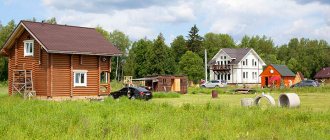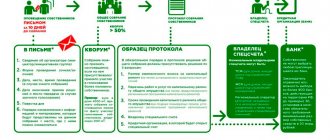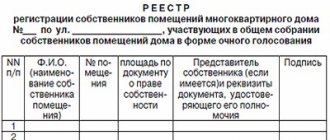Today, a TSN is often created to manage apartment buildings and other real estate assets. Some people confuse this abbreviation with HOA and consider it a synonym. But TSN is a relatively new form of management.
You need to understand what it means, what advantages and features it has, how it differs from HOAs and management companies, and how it is created. This will help you understand whether it is worth choosing TSN or whether it is better to give preference to another method of managing common property.
Decoding the abbreviation
TSN is a form of home management.
It occurs quite often today. However, not everyone knows how TSN stands for. This abbreviation is the name of the organization of the Association of Real Estate Owners. This institution is created to dispose, maintain and manage apartment buildings, private residential buildings located outside the city or within its boundaries, land plots, garages, utility buildings and other objects.
TSN was introduced instead of HOA, DNP and SNT from September 1, 2014. Similar changes were caused by the adoption of Federal Law No. 99 of May 5, 2014. It was this document that made adjustments to the content of the Civil Code of Russia.
What does the law say?
When creating and operating TSN, you must be guided by the provisions of the current legislation. This area is regulated by the Civil Code of the Russian Federation. This legal act was introduced in 1994. The fourth chapter of the Civil Code of the Russian Federation is devoted to the issues of the Association of Real Estate Owners, in particular Articles No. 123.12-123.14.
Today, more and more new associations of owners are being created in the form of TSN:
- multi-apartment residential and private buildings;
- premises in several buildings;
- country houses, vegetable gardens and horticultural plots, etc.
The activities of TSN are regulated not only by the Civil Code, but also by the Housing Code of the Russian Federation. In particular, we are talking about articles No. 135, 136, 143, 145, 149, 150, 152, 161 of the Housing Code of Russia.
Since this form of property management appeared relatively recently, a special regulatory act has not yet been developed that would regulate the activities of TSN. Therefore, when creating a Real Estate Owners Association, you must be guided by the provisions of the general legislative framework.
TSN as a governing body - MKD
By decision of the general meeting of members of the partnership, the powers of the permanent bodies of TSN can be terminated early if gross violations of their duties, incompetence or the presence of other serious grounds are discovered and proven (clause 2 of Article 123.14 of the Civil Code of the Russian Federation).
In accordance with Article 143.1 of the Housing Code of the Russian Federation, members of TSN and non-member owners of premises in apartment buildings have the right:
- receive information from the management bodies of the partnership about its activities;
- appeal decisions of TSN management bodies in court;
- demand high-quality provision of services and performance of work.
For-profit or non-profit organization?
In accordance with current legislation, a Real Estate Owners Association is a non-profit form of corporate organizations. It brings together owners of various types of real estate. TSN is a legal entity.
The company has its own Charter, which reflects all its rights and obligations, seal and bank account. It has the right to enter into agreements with utility companies and engage contractors to carry out the necessary work.
Its main goal is not to make a profit, but to solve problems that affect the quality of life of property owners. All money collected from the owners of an apartment building (MKD) and non-residential properties can be used by TSN exclusively for the maintenance and servicing of common property.
Dear readers! To solve your problem right now, get a free consultation
— contact the on-duty lawyer in the online chat on the right or call:
+7
— Moscow and region.
+7
— St. Petersburg and region.
8
- Other regions of the Russian Federation
You will not need to waste your time and nerves
- an experienced lawyer will take care of solving all your problems!
Pros and cons of TSN
As in the case of an HOA, the association in question provides the owner with the opportunity to more flexibly manage the property and its maintenance. Main advantages of TSN:
- Independent decision-making on the improvement of apartment buildings and other real estate in terms of common (with other owners) property;
- Reducing the cost of effective home management under certain conditions;
- Making decisions in the interests of the owners, not the management company.
The costs of property management are reduced if the members of the simplified tax system, as well as the owners participating in the general meeting, are sufficiently competent in the issues under consideration. Otherwise, there is a risk that such activities will increase utility costs.
Disadvantages include:
- High probability of irrational use of available resources;
- The minority is obliged to obey the will of the majority of owners;
- Introduction of membership fees, the spending of which is often opaque and unclear;
In addition, there is a high risk of bankruptcy of TSN at the initial stage. This means that the funds invested and transferred to the organization will not be returned.
The rights and obligations of participants in a real estate owners' association are enshrined in the organization's charter. They are determined individually and relate to the maintenance, operation and repair of real estate, in relation to which the organization is created.
Advantages and disadvantages
Residents of apartment buildings have two options for resolving the issue of maintaining common real estate: create a TSN, enter into an agreement with the Management Company. Each of these options has its own strengths and weaknesses. Today, not everyone wants to cooperate with the management company. This is due to high costs and the inability to track where the collected money is spent.
Also, management companies often do not perform their functions properly. With all these disadvantages, there are also advantages to this form of home management. For example, residents do not need to delve into issues of maintenance and upkeep of common property. The solution to all problems falls on the shoulders of the management company.
It's helpful to know the pros and cons of a homeowners' association. This will help you avoid making mistakes in choosing the form of management of the MKD.
The advantages of creating a TSN include the following:
- community of joint property. The Association of Real Estate Owners manages and maintains not only residential buildings, but also commercial properties, land plots, basements and attics. This makes it possible to more effectively manage various assets;
- saving time for owners of apartments in MKD (subject to the presence of a competent TSN board);
- The partnership conducts open business activities. Residents of an apartment building have access to financial statements;
- possibility of increasing property. Owners of MKD apartments can count on the fact that the profit received through competent property management will be used for general needs, to improve the condition of the house or the surrounding area.
TSN also has its disadvantages, these include the following:
- Resolving issues takes a lot of time. Therefore, it is not advisable to create TSN in old houses. For example, collecting money for repairs can take a long time. This is fraught with the transition of the MKD into an emergency state;
- probability of bankruptcy. Since TSN is a legal entity, it can become insolvent and liquidate at any time. In this case, there is no guarantee of return of funds invested in this organization;
- lack of good legislative support;
- decisions of TSN members may contradict the interests of MKD residents. Issues are resolved by a council headed by the chairman of the partnership. TSN can rent out part of the common property or sell it. The owners of an apartment building are unlikely to like such changes;
- To create a TSN, you must obtain a license. This is an additional cost of money and time.
Rights and obligations
The legal capacity of a real estate owners' association is enshrined in the main document - the organization's charter.
This form of legal the person has specific, separate property, which, if necessary, will be used to meet the obligations assumed.
So the participants are not responsible for the actions of the organization :
- Neither subsidiary.
- Not in solidarity.
- Not a share.
The partnership assumes responsibility for the formation of supervisory and management bodies created to coordinate and make decisions by its members and other legal entities (for example, to carry out construction work or connect to the housing and communal services network). The main governing body of the association must make decisions on establishing mandatory contributions for members of the organization.
TSN can carry out entrepreneurial activities and receive income from it (according to the Civil Code of the Russian Federation), but under two conditions:
- This activity must meet the goals of the association (as enshrined in the charter).
- Profits cannot be distributed among members of the organization.
All actions of the organization must correspond to its goals and objectives. The association has the following rights :
- Conclude agreements that satisfy the needs and interests of its members: defining the management of the organization’s common property, the provision of housing and communal services, etc.
- Indicate the organization's income and expenses for the year by drawing up an estimate. On its basis, a plan of contributions and payments will be drawn up, calculated for each owner (taking into account his share in the right of common ownership of the property).
- Determine the transfer and receipt of funds by persons who perform work and provide services for TSN.
- Conclude a contract for the purchase and sale of real estate (in shared ownership), as well as lease (limited or full use of part of the common property) or exchange of partnership property.
- Carry out work and provide services to property owners.
- Receive and use loans from banks.
If the participants do not fulfill their obligations as set out in the charter or the decision of the meeting, the partnership may try in court to force them to fulfill their obligations, make payments or contributions. Also, the organization, in court, can demand from violators compensation for losses caused due to failure of members to fulfill their obligations.
TNS is obliged :
- Conduct its activities within the framework of the norms established by law, as well as in accordance with its charter.
- Conclude contracts with third parties to perform specific work.
- Fulfill your obligations and monitor the sanitary and technical condition of common property.
The owner becomes a member of TSN after he submits an application for membership there. You can leave the partnership by filing an application for withdrawal from it.
Its members have the right :
- Request TSN for information about its activities.
- Participate in the activities of the association independently or by sending a proxy there (select and become a candidate for management positions, make proposals regarding improving the quality of work).
- If they do not agree with the decision of the governing bodies, they can appeal it in court.
- Familiarize yourself with the main documents of the organization.
- Demand from TSN the proper quality of services and work that they are obliged to carry out in accordance with the charter.
Form of governance and charter
To register a Real Estate Owners Association, it is necessary to prepare the Charter. This is the founding document of an organization that governs its activities. It should be drawn up taking into account the norms of the current editions of the Housing and Civil Codes of Russia.
The Charter must contain the following information:
- name and type of organization;
- location address;
- subject, tasks and goals of activity;
- organization structure;
- competencies of the partnership;
- procedure for resolving issues, etc.
The TSN Charter is adopted at a general meeting of all real estate owners by a majority vote (in accordance with the second part of Article No. 135 of the Housing Code).
The decision can also be made by absentee survey of apartment owners. There are samples of TSN Charters on the Internet. They can be used as a basis for creating a document.
To register a Real Estate Owners Association, you must develop your own Charter. If you can’t do this yourself, then you should seek help from a specialist.
Creation and membership of TSN
The basic rules for creating a TSN are prescribed in Article 123.12/14 of the Civil Code of the Russian Federation. In order for TSN to work and ensure the interests of members, it must be registered as a legal entity. To do this, you must perform the following procedures:
- Hold a meeting of all property owners. The minutes of the owners' meeting raise the issue of creating TSN. The decision must be made unanimously, otherwise the decision to create is considered not made. The minutes must be signed by the chairman of the meeting and the secretary, and also have a separate tab with the signatures of all persons present and voting at the meeting “for” or “against” the decision.
- Approve the TSN Charter at the meeting (the requirements for the charter are determined by the Civil Code of the Russian Federation).
- Have the form for registration of a legal entity certified by a notary.
- The registration of TSN is handled by the tax office, so registration documents are sent to the Federal Tax Service office. The Form certified by a notary, two editions of the Charter, as well as the protocol itself, in which the decision to create the TSN, is submitted to the Federal Tax Service.
In order to become a member of TSN, an individual or legal entity must submit an application to become a member of TSN. When creating TSN, the owners who voted for the creation of the partnership also submit an application to join it. The application must indicate the object owned by right of ownership, as well as attach a copy of the document certifying this fact (or submit the original).
Number of participants and their responsibilities
The Association of Real Estate Owners, according to the second part of Article No. 162 of the Housing Code of Russia, includes owners of apartment complexes who received more than 50% of the votes in a general house vote.
The number of board members is not established by law. The main person of TSN is the chairman. He is selected from among the board members. This is the sole executive body. How well the partnership will cope with its tasks depends on it.
He bears full responsibility for the functioning of TSN. The permanent collegial executive body is the board. It considers and resolves important issues and problems regarding the maintenance and management of real estate.
An audit commission is also selected. She monitors the activities of the partnership and organizes checks of its documentation. Her responsibilities include preparing annual reports on the functioning of TSN.
Issues on the agenda
Please note that the proposed form of the protocol includes only issues that are mandatory for discussion at the general meeting of owners of premises in the apartment building. In practice, quite often decisions are made at general meetings:
- on the selection of an authorized person to carry out state registration of TSN;
- on the selection of the TSN board;
- on the election of the chairman of TSN (if the election of the chairman is referred by the charter of TSN to the competence of the general meeting of members - part 3 of article 147 of the Housing Code of the Russian Federation);
- on the selection of the audit commission.
The inclusion of these issues on the agenda remains at the discretion of the initiative group of owners, since according to clause 3, part 1, art. 145 of the Housing Code of the Russian Federation, the election of members of the board (from among the members of the HOA - part 2 of article 147 of the Housing Code of the Russian Federation), as well as members of the audit commission of the partnership (which cannot include members of the board - part 1 of article 150 of the Housing Code of the Russian Federation) is within the competence of the general meeting HOA members. Since the chairman of the board acts on behalf of the partnership without a power of attorney (see part 2 of article 149 of the Housing Code of the Russian Federation), as a rule, it is he who registers the TSN (clause “a”, paragraph 1.3 of article 9 of the Federal Law of 08.08.2001 No. 129 ‑FZ).
How to create it correctly in an apartment building?
The creation of TSN is regulated by the Housing Code of the Russian Federation. In particular, we are talking about article No. 136 of this regulatory act. Its provisions must be strictly adhered to so that the creation of a Real Estate Owners Association takes place quickly and without any difficulties.
It is recommended to follow this algorithm:
- coordination of such a form of property management with all property owners. The decision is made at a general house meeting by voting. Only one TSN can be created in an MKD;
- preparation of minutes of the general meeting. The document is signed by all those who voted;
- development and approval of the Charter;
- election of TSN managers;
- preparation of a package of documents. It includes minutes of the general meeting of property owners, the applicant’s passport, the Charter, an application;
- payment of state duty;
- state registration of a real estate owners' association. Conducted at the tax office located in the area where the object is located;
- opening a bank account. It will receive financial resources from membership fees, etc.;
- notification of the local administration, Housing Inspectorate about the start of TSN activities;
- obtaining a license to manage an apartment building and other buildings.
Expert opinion
Maria Lokshina
Family law expert since 2010
TSN is not responsible for the obligations of its members, who in turn are not responsible for the legal relations of the association. Such a partnership can be transformed into a consumer cooperative by decision of the owners.
Distinctive features
Such an association of owners differs from an HOA in the following features:
- HOA participants are only the owners of living space in one specific building. But owners of any type of real estate, both in the city and outside it - housing, offices or land, can become members of TSN.
- Within the framework of TSN, it is envisaged to receive a profit (despite its non-commercial orientation), which will be used to satisfy the needs and interests of the members of the partnership. So in TSN you can manage various real estate objects.
- The HOA decided only the procedure for managing the property of the house and issues related to housing and communal services. TSN solves much more diverse problems - conducting commercial activities related to real estate objects that are in shared ownership, construction of new buildings, etc.
- They also differ in tax system. The homeowners' association paid taxes according to a simplified system, but TSN does not have the right to do so.
- Only individuals can be participants in an HOA, and in TSN - both legal entities and their joint associations.
- The HOA did not require a license to operate, but TSN must be licensed.
About the advantages of organizing this type of association of real estate owners, see the following video:




